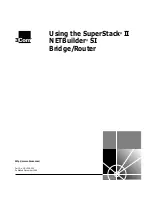
Managed Switch CLI Manual, Release 8.0.3
IPv6 Commands
7-54
v1.0, July 2010
no trapflags
(OSPFv3)
Use this command to revert to the default reference bandwidth.
•
To disable the individual flag, enter the
group name
followed by that particular flag.
•
To disable all the flags in that group, give the group name followed by
all
.
•
To disable all the flags, give the command as
trapflags all
.
Default
disabled
Format
trapflags {
all |
errors {all | authentication-failure | bad-packet | config-error |
virt-
authentication-failure | virt-bad-packet | virt-config-error} |
if-rx {all | if-rx-packet} |
lsa {all | lsa-maxage | lsa-originate} |
overflow {all | lsdb-overflow | lsdb-approaching-overflow} |
retransmit {all | packets | virt-packets} |
rtb {all, rtb-entry-info} |
state-change {all | if-state-change | neighbor-state-change | virtif-
state-
change | virtneighbor-state-change}
}
Mode
Router OSPFv3 Config
Format
no trapflags {
all |
errors {all | authentication-failure | bad-packet | config-error |
virt-
authentication-failure | virt-bad-packet | virt-config-error} |
if-rx {all | if-rx-packet} |
lsa {all | lsa-maxage | lsa-originate} |
overflow {all | lsdb-overflow | lsdb-approaching-overflow} |
retransmit {all | packets | virt-packets} |
rtb {all, rtb-entry-info} |
state-change {all | if-state-change | neighbor-state-change | virtif-
state-
change | virtneighbor-state-change}
}
Mode
Router OSPFv3 Config
















































